Noah Sacco
MULTIMEDIA JOURNALIST
402-671-2452 : noah.sacco@gmail.com
Mental Health in College Athletes Blog
Podcast ft. Storm Speaks Founder Jeramy Randol
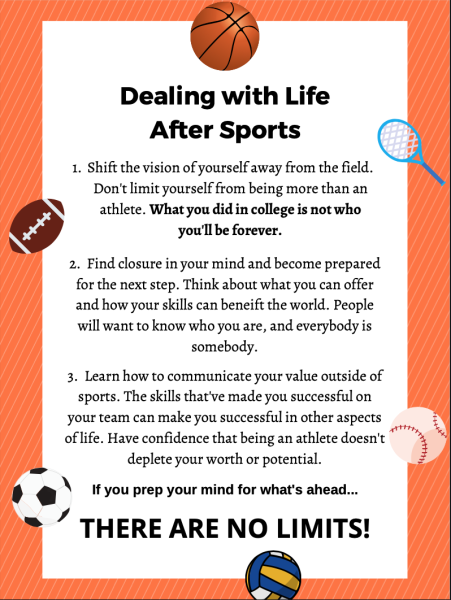
Preparing For Life After Sports
04/10/21
College athletics is a time filled with amazing moments. The adrenaline of game days is something you have to feel to believe and the camaraderie you form with teammates are things you will cherish for a lifetime. Many former student-athletes will tell you it’s an experience unlike anything else in the world.
We all know it doesn’t last forever though.
Once the four (or five with COVID) years of eligibility are over, the focus centers on your new role in the real world. But it can be tough for athletes who have thrown themselves into their sport so much that their future has become an afterthought. Having that for so long and leaving that behind can be mentally damaging for athletes if they don’t prepare for a life without sports.
These are some ways student-athletes can prep their mind for a healthy transition into the real world after they leave the game for good.
1. Come to the realization that your playing days are officially over. The sooner you accept that, the more confident you will be in closing that chapter of your life and opening a new one.
This falls in line with changing your vision of yourself and who you think you are while you’re playing. There’s a big difference between being an athlete and someone who happens to be an athlete among other things. Don’t limit yourself! Your mind is a powerful tool, and if you don’t think you can succeed, it can become your most formidable opponent.
2. Reach complete closure that you can go on with your life. You will never be able to move on until you convince yourself you are ready for the next step. Once you do, think about what you know, your skills, and how you can contribute in the workforce.
Believe it or not, the time will come where no one will care what you achieved in your sport anymore. Your first-team all-conference honor will elevate you to new heights on campus, but the same can’t be said for employers looking to hire you for an audit associate position. What they want to know is the rest of you and how you can provide value outside of being an athlete. So tell them.
3. The past will always be the past, but understand the invaluable skills you have forged through sports can make you successful in any avenue of life. College athletes gain discipline, determination, and leadership abilities beyond what many of their peers will.
More importantly, learn how to communicate those intangibles. Regardless of your experience levels, know that being a student-athlete enhances your ability to learn, grow, and develop in any career you choose. Don’t minimize your chances of success outside the lines because you were an “athlete.” Grow confident in your potential, because it’s endless.
It’s difficult to come to terms with walking away from the game and figuring out what you’re going to do next. As a senior in college, this is a reality that I will have to face in a month. But one thing is certain:
Life is long and there’s a lot of time to live once you’re done with sports. Your label on the field does not define who you are. Believe you can achieve anything, because there are no limits to what you can do with your life when sports isn’t in the picture anymore.
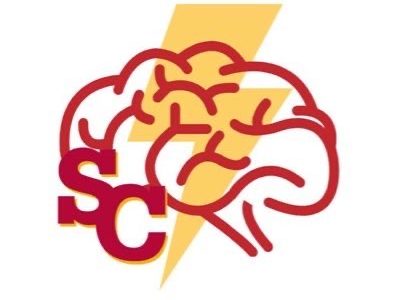
Storm Speaks: Creating an Open Dialogue for Simpson Athletes
03/22/21
Student-athletes everywhere struggle with mental health. The good news is that many colleges have on-campus organizations to help mitigate these battles. The down side is not every school has these outlets (i.e. Simpson College).
Jeramy Randol did something about it.
During the summer, the senior football player attended a mental health conference at UCLA presented by Dam Worth It Co. where he noticed a void in athletic mental health discussions at Simpson.
“It was really eye-opening, and I saw all the things other people were doing on other campuses and I was like, why don’t we have something like this?” Randol said. “Our athletes could really benefit from having this and mental health, especially right now, is something that needs to be talked about and shouldn’t be stigmatized.”
That led Randol to create Storm Speaks, an organization on campus providing athletes at Simpson a space and platform to discuss their mental health.
The overall goal? Create a welcoming environment to make these conversations comfortable and free from judgement.
“We always start by saying one good thing that’s happened since the last time we met, one thing they’re struggling with, and one thing they’re looking forward to… Being that backboard to help out from a mental standpoint and being able to relieve that stress by listening goes a long way.”
Students have been attending the meetings and the impact is already evident.
“The people that have come to the meetings have felt comfortable reaching out to me in person. We have a wide representation of all the sports on campus within our group and building that family feel is awesome, which is what Simpson athletics should be all about.”
All Storm Speaks meetings have been virtual thus far. But Randol hopes to make the transition to in-person with campus COVID protocols beginning to open up.
“It’ll be a lot more impactful once we get there, having face-to-face interaction rather than a video screen. You don’t have as much motivation to talk on the screen than you would in person, so hopefully we get there.”
Storm Speaks meetings occur every other Thursday at 8 p.m. via Zoom. For those who continue to face mental health issues, Randol urges them to email him, come to a session, or visit the free counseling services on campus.
“It’s just another thing that you need to strengthen. It’s definitely a hard subject to talk about, but if you find the right person or right people in your life, you shouldn’t be hesitant. They’re going to take you seriously and help you get that comfort that you need to get past whatever you’re dealing with.”
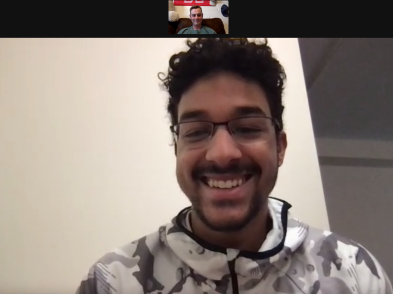
Finding Purpose Away From Athletics
03/1/21
Mental health is a precious thing. It dictates our level of interactions with others and the motivation to get our tasks done for the day. Student-athletes can experience the positives of exercise and activity through their sport and their mental wellness can flourish in return.
But when that ability to participate in the main balance of their lives is gone, so can their psychological strength. I’ve experienced periods of mental health issues when I was injured during my sophomore season, but I’m blessed it wasn’t career-ending. Unfortunately, others aren’t so lucky.
Junior and former Simpson baseball player Tyrese Moore was one of them. I spoke with Moore about his two labrum tears in two years and how it led to the painful decision to hang up his cleats for good.
“Growing up I’ve always been pretty injury-free, so having those injuries back to back like just felt disappointing,” Moore said. “I wanted to play so bad, but I physically couldn’t.”
Moore was a dual-sport athlete at Waukee as well as a first-team All-Conference selection in baseball. He started in centerfield his freshman year for the Storm, but felt crushed seeing his teammates having fun while on the bench.
“I felt helpless,” he said. “That was probably the hardest part for me because I knew my body wasn’t going to heal, and I realized that things may not turn out how I wanted them to.”
Statistics from the NCAA student-athlete well-being study in the fall revealed stunningly high numbers of male and female athletes feeling overwhelmed, exhausted, anxious, and depressed. Moore shared these emotions as he experienced bouts of isolation and anxiety after his departure from the team.
But Moore has used the support of friends around him to cope with the harsh reality of quitting the sport he loves. With more time to redefine his purpose in college, he has even taken up drawing and painting as a hobby.
Here are some of his awesome samples!
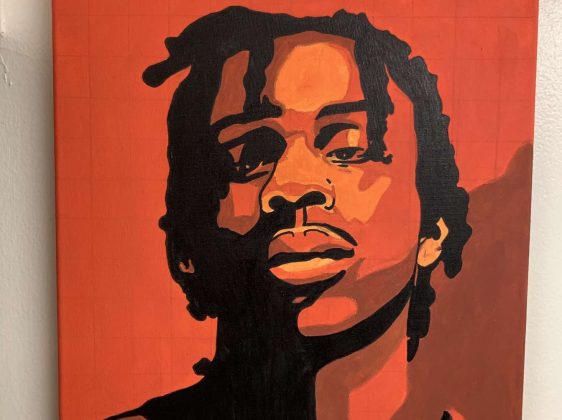
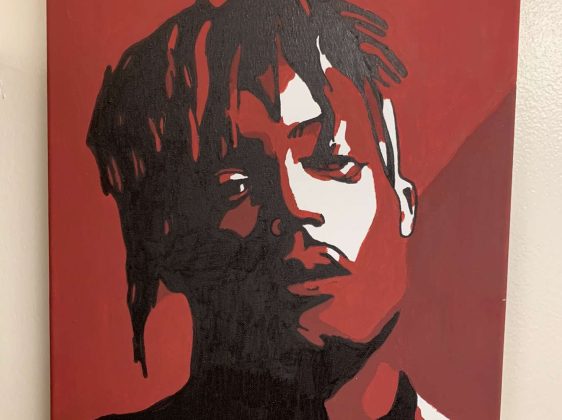
“Find things you enjoy to pass the time and find a good supporting cast of friends who you feel comfortable talking about your feelings,” he said. “Getting it off your chest is the best part and finding the person that will listen is gonna help you the most.”
The journey for Moore has been a hard one. Harder than most people care to think. But he’s found methods to cope with the harsh reality of having to quit the sport he loves, and so can you. If you are struggling, know there are a number of outlets intended for dealing with these mental battles.
Whether it’s on or off the field, everyone has a purpose in life. Let others help you find it.
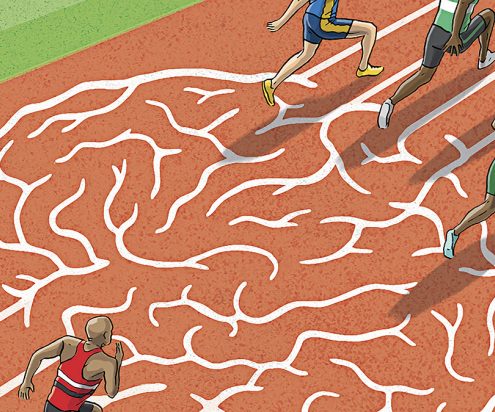
Image from globalsportsmatter.com
Stand Up to the Stigma
02/22/21
College athletes is a blessing and a curse. It’s a special feeling to represent your school in the sport you’ve been playing your whole life. What you don’t know are the mental ramifications that follow. Your teammates and coaches soon notice a change in your behavior, but you don’t tell them what’s going on, and they don’t bother to ask.
These situations happen all too often on college campuses where athletic mental health becomes a hot-button topic. What feeds this narrative? Stigmatization.
The problem isn’t that student-athletes don’t know about mental health resources. Nearly every athletic training room has posters detailing them. The issue is that athletes want to seek help, but the stigma of their struggles stands in the way.
There is an existing assumption that athletes should be able to “push through” their psychological challenges as they do their physical ones. Forget about what’s going on in your head and focus on what’s happening on the field. Expectations like this undermine the athlete’s perspective and, in turn, decreases their chances of getting vulnerable about their psyche.
I created a poll on Twitter asking what prevented athletes from revealing their battle with mental health. The choices were “lack of understanding”, “not getting better”, “sign of weakness”, and “judgement from others”. As I predicted, the majority of people voted for the second option.
Our sports world tends to think of professional, and college, athletes as indestructible beings who can overcome any obstacles, both physical and mental. But studies like Fifpro back in 2015 reveal how athletes endure more mental illnesses than the average person.
Let me be clear: vulnerability is not a weakness. Rather, it’s a sign of strength. Disclosing the truth of how you’re feeling takes courage, and when others see you taking that risk of judgement and perceived “weakness”, it shows them it’s possible.
I’ve tweeted before about Victoria Garrick’s TedTalk on athletic mental health and I think her story is still captivating. Her emotional experiences as a USC volleyball player and her personal struggles reveal her vulnerability and motivation for others to seek help when they feel out-of-control mentally.
In 22 minutes, Garrick cuts the stigma in half.
Similar stories can be found on your campus. Senior Simpson soccer player Justin Gilmour experienced mental health symptoms when he tore his ACL last fall but found support through Cal Busby, his athletic trainer. Now he is 100% healthy and more than ready to play this spring.
It’s my goal this semester to continue that conversation and move the topic of student-athlete mental health away from taboo discussions. It’s on all of us to empathize and close that gap between the superhuman athlete and a human being.
An athlete will get treatment without hesitation if they break their arm. We need to start thinking of mental health in the same way. Break the pattern and stand up to the stigma.
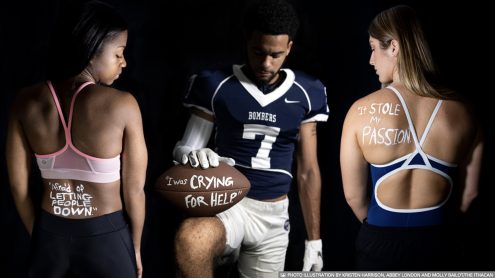
Healing Mind and Body: Injured athletes struggle with mental health
Image from theithacan.org
Sports Injuries: Much More Than Physical
02/15/21
Imagine you’re a star player on your college team. You were an All-American the season before and you’re on track to break records people thought would never be touched. You have unlimited potential and this season will be the best of your athletic career.
Until it isn’t. Your ACL is torn a week before the first game and now, having success on the field is only a fantasy. These situations can happen to any student-athlete, but what’s scarier are the effects to an athlete’s mind.
The responses to injury can differ within athletes based on the sport and its severity. With the added pressures of succeeding in the classroom and on the field though, injuries increase those stressors.
Depression is one of the most common. 33% of injured athletes in Division I football reported high levels of depressive symptoms. These factors can also extend into their daily lives and affect their mood, motivation, and emotional levels altogether.
Athletics are an integral part of the college lifestyle. For the fan, it’s a source of entertainment throughout the week. For the athlete, it’s an escape from reality.
Some come from a broken home. Others struggle academically. Regardless, student-athletes turn to their sport as a method to release the strains of daily life and focus on accomplishing a goal with their teammates. When they don’t have that opportunity anymore, their mind can pay the price worse than their body.
You may ask yourself: “Why isn’t this issue publicized more often? Why don’t athletes speak upon about their mental struggles?” Well, they’re afraid.
The stigma surrounding mental health in college athletes portrays mental health discussions as a sign of weakness. If an athlete reveals this, they won’t be seen as a “winner” and would be interpreted as an “excuse” by coaches, teammates, and their community.
This belief is 100% false. Your coaches and peers DO care about what you’re going through and they DO want to help your mental wellbeing. Even if an injury takes away your ability to play, they will support you in your life choices off the field. If not, let me talk to them.
Stories like Erin Finn, an All-American runner from the University of Michigan, help prove my point. She illustrates how athletes can rise above the playing field and redefine their purpose in the world, even when injuries hinder their athletic dreams.
No athlete likes to be injured. It’s okay to feel sad and frustrated, because chances are it will happen to everybody. But if you are feeling overly stressed and like your injury is dictating your life, never feel ashamed to speak out. You’d be surprised how many people want to help you get better.
Just ask Eric Pimentel in the Athletic Training room at Simpson.
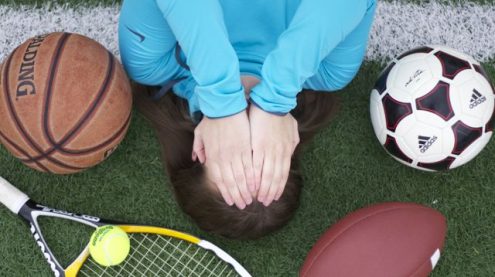
Image from UnearthedMag
The Off-Field Battle
02/8/21
Over the years, college athletics has seen a shift in its impact on society. It has developed from an extracurricular activity to one of the largest sources of profit for universities.
For those off the field, college sports can be viewed as a nationally televised, money-making business. You may hear about the physical strains that student-athletes endure, but what you don’t see on SportsCenter are the most damaging: the psychological.
A study for NCAA student-athletes found between 10-15% will experience psychological issues severe enough to warrant counseling. Playing a sport does not make an athlete immune to mental health. In some cases, it exacerbates the issue.
College athletics is a demanding culture. The life of a student-athlete involves having to balance practice, weight training, grades, physical health and a social life. That’s without considering the larger pressures of performing well on game day.
All these stressors contribute to a decrease in an athlete’s mental well-being. Some of the most common conditions include depression, anxiety, alcohol/substance abuse and eating disorders. In more severe cases, it can lead to suicide.
Over 477 student-athletes have died from suicide in the last decade. Some deaths were linked to concussions and CTE, leading to lifelong brain injuries. One thing I learned quickly is that physical struggles can create psychological ones.
I experienced my first long-term injury during my sophomore year just after the fifth game of the season: a grade-one hamstring strain. Though it sounded like a short road to recovery, the injury lasted over a month. By the time I was healed, the season was ultimately over.
There were times when I felt depressed. Physically not being able to help your team is a pretty deflating feeling. But my coaches, teammates and athletic trainers were the foundation of my support system and they all helped me get back to my best mental state.
Mental illness is a hidden epidemic. It cannot be cured with a vaccine and it will always be prevalent, both in student-athletes and regular people. How can we fight it?
Talk and listen to those who are struggling.
If they don’t want to discuss with you, find someone to whom they will and learn about resources from organizations like the National Alliance on Mental Illness.
Whether they’re the team captain or fifth-string quarterback, any athlete can be affected by mental health. Don’t let me go through this crisis alone.